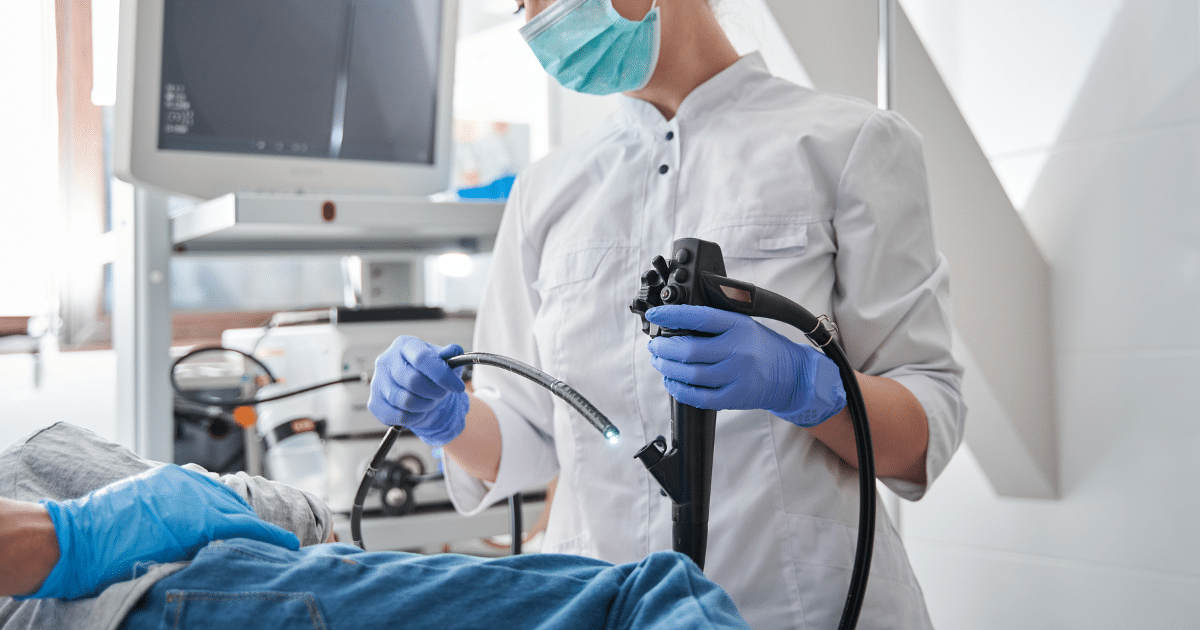With the exception of some skin cancers, colorectal cancer—which includes colon cancer and rectal cancer—is the fourth most common cancer in men and women in the United States, according to the Centers for Disease Control and Prevention (CDC). It is also the fourth leading cause of cancer deaths.
However, over the last several decades, the death rate for colon cancer has decreased significantly thanks to improved treatments and increased screening measures. An estimated 64 million adults ages 50 to 75 were screened for colorectal cancer in 2020, and 71.6% of adults in that age group were up-to-date with screening based on all test types. Since regular screenings aren’t recommended until age 45, it is important to recognize the symptoms of colon cancer so it can be treated as early as possible.
What are the risk factors for colon cancer?
The risk of developing colorectal cancer increases as you age, and most cases occur in people over the age of 50. Although the incidence of colon cancer in younger adults has increased in recent years, it is still uncommon. It is also unclear what has caused the increase.
Certain lifestyle factors can also increase your risk of developing colorectal cancer. These include:
- Physical inactivity or a sedentary lifestyle
- Overweight or obesity
- Alcohol consumption
- Tobacco use
- A diet low in fruits and vegetables
- A low-fiber and high-fat diet, or a diet high in processed meats
Family history is also a major risk factor for developing colon cancer, especially if an immediate family member had the disease. This can be due to environmental or genetic factors, or both. If you have a family history of colorectal cancer, you may want to talk to your doctor about genetic counseling to determine your risk.
Inflammatory bowel disease, such as ulcerative colitis or Crohn’s disease, can also increase your risk for colon cancer. According to the Crohn’s & Colitis Foundation, inflammation of the colon can cause continuous turnover of cells in the intestinal lining, increasing the chances of irregularities that can lead to cancer. If you have inflammatory bowel disease, especially if you have an eight to 10-year history of the disease, you should get a colonoscopy every one to two years.
Signs and symptoms of colon cancer
Colon cancer is considered a silent killer because there are usually no symptoms in the early stages. It takes years for colon cancer to progress to a stage where you begin to experience symptoms. When colon cancer is caught in stage 1, before it spreads to other parts of the body, it is highly treatable and can be cured with surgery. Once colon cancer progress to stage 4, the most advanced stage, the cancer has spread to other parts of the body and treatment options are limited.
Men and women generally experience the same symptoms of colon cancer when they do appear. Symptoms may include:
- A change in bowel habits
- Diarrhea, constipation, or the feeling that the bowel does not empty completely
- Blood in or on the stool
- Persistent abdominal aches, pain, or cramps
- Unexplained weight loss
While these symptoms can mean colon cancer, it is also possible that they may be caused by something else. If you have any of these symptoms, talk to your doctor.
What are the screening recommendations and options for colon cancer?
The U.S. Preventive Services Task Force changed its colorectal cancer screening recommendations in May 2021. The Task Force lowered the recommended age to begin screening from 50 to 45 to combat the increase of young-onset colorectal cancer. It is projected that colorectal cancer will be the leading cause of cancer deaths in patients ages 20 to 49 by 2040.
A colonoscopy is the gold standard for detecting colon cancer, but it’s not the only screening method. During a colonoscopy, the doctor inserts a long, thin, flexible lighted rod into the rectum to check for polyps or cancer inside the rectum and entire colon. Colonoscopies are recommended every 10 years for people who do not have an increased risk of colon cancer.
A similar screening is called a flexible sigmoidoscopy checks the rectum and lower third of the colon for polyps or cancer. It is recommended every five years, or every 10 years with a fecal immunochemical test (FIT) that uses antibodies to detect blood in the stool.
Other stool tests, besides FIT, include the guaiac-based fecal occult blood test (gFOBT) and the FIT-DNA test. The gFOBT uses the chemical guaiac to detect blood in the stool. It is done once a year at home. You’ll receive a kit from your doctor to obtain a small amount of stool using a stick or brush. Then you send the kit back to the doctor or a lab, where it will be analyzed for the presence of blood.
The FIT-DNA test combines FIT with a test that detects altered DNA in the stool. This test requires the collection of an entire stool movement that is sent to a lab. It is done once every three years.
The screening type that is right for you will depend on your preferences and any existing medical conditions, as well as your family history. Each test has its advantages and disadvantages, so be sure to talk to your doctor before making a decision.
How to reduce your risk of colon cancer
Getting regular colon cancer screenings is the most effective way to reduce your risk of getting colon cancer. The majority of colorectal cancers start as precancerous polyps in the colon or rectum. Since these polyps may not cause symptoms in the early stages, the only way to know they are there is to get screened. If they are detected early, polyps can be removed before they turn into cancer.
Lifestyle changes can also help you reduce your risk of getting colon cancer, such as getting enough physical activity and maintaining a healthy weight. If you drink alcohol or smoke tobacco, consider limiting your consumption. Dietary changes can also help you reduce your risk; try to eat a diet that is low in animal fats and high in fruits, vegetables, and fiber.
PACT can help
If you suspect signs of colon cancer or are due for screening, reach out to your doctor. PACT physicians are ready to help.







